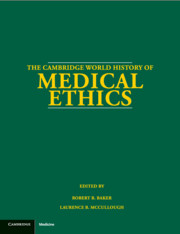Book contents
- Frontmatter
- PART I AN INTRODUCTION TO THE HISTORY OF MEDICAL ETHICS
- PART II A CHRONOLOGY OF MEDICAL ETHICS
- PART III DISCOURSES OF MEDICAL ETHICS THROUGH THE LIFE CYCLE
- PART IV THE DISCOURSES OF RELIGION ON MEDICAL ETHICS
- PART V THE DISCOURSES OF PHILOSOPHY ON MEDICAL ETHICS
- 18 The Discourses of Philosophical Medical Ethics
- PART VI THE DISCOURSES OF PRACTITIONERS ON MEDICAL ETHICS
- PART VII THE DISCOURSES OF BIOETHICS
- PART VIII DISCOURSES ON MEDICAL ETHICS AND SOCIETY
- Appendix: Biographies: Who Was Who in the History of Medical Ethics
- Bibliography
- Index
18 - The Discourses of Philosophical Medical Ethics
from PART V - THE DISCOURSES OF PHILOSOPHY ON MEDICAL ETHICS
Published online by Cambridge University Press: 28 May 2012
- Frontmatter
- PART I AN INTRODUCTION TO THE HISTORY OF MEDICAL ETHICS
- PART II A CHRONOLOGY OF MEDICAL ETHICS
- PART III DISCOURSES OF MEDICAL ETHICS THROUGH THE LIFE CYCLE
- PART IV THE DISCOURSES OF RELIGION ON MEDICAL ETHICS
- PART V THE DISCOURSES OF PHILOSOPHY ON MEDICAL ETHICS
- 18 The Discourses of Philosophical Medical Ethics
- PART VI THE DISCOURSES OF PRACTITIONERS ON MEDICAL ETHICS
- PART VII THE DISCOURSES OF BIOETHICS
- PART VIII DISCOURSES ON MEDICAL ETHICS AND SOCIETY
- Appendix: Biographies: Who Was Who in the History of Medical Ethics
- Bibliography
- Index
Summary
INTRODUCTION
There is a comforting certitude about this chapter's title. It indicates the intersection of two fields, philosophy and medical ethics, suggesting to readers that they will find within it an account of philosophical discourses on medical ethics in various cultures over the course of time. This veneer of titular certitude is misleading. Undoubtedly, most healing traditions embrace some notion that healers have some special responsibilities; however, these notions of responsibility did not assume the form that we now call “medical ethics” until the nineteenth century, when the expression medical ethics, and its counterparts (e.g., déontologie médicale (medical deontology)) were coined (see Chapters 1, 32, 36). Moreover, for most of human history, it was not philosophy but religion and civil society/law that served as the dominant discourses of social authority. The Hippocratic Oath, for example, opens with an invocation of the gods, not with an appeal to philosophical concepts. Even Thomas Percival (1740–1804), who coined the expression medical ethics in his eponymous work, Medical Ethics (Percival 1803), originally titled it “Medical Jurisprudence,” in an attempt to draw on the social authority of law, which was far more authoritative than philosophy or ethics. Complicating matters further, even in those eras when philosophy commanded social authority, few physicians seem to have read much philosophy. Moreover, had these few sought moral guidance from philosophers, they would have found few relevant texts.
- Type
- Chapter
- Information
- The Cambridge World History of Medical Ethics , pp. 279 - 310Publisher: Cambridge University PressPrint publication year: 2008



